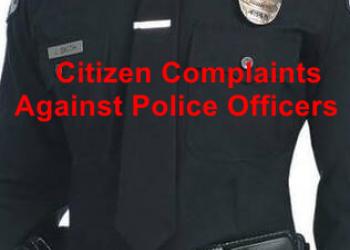By Robert Phillips, Deputy District Attorney (Ret).
For a citizen’s complaint against a peace officer to be accepted and investigated, the citizen must first read and sign an acknowledgment that the filing of a false citizen complaint is a crime.
One legislatively imposed means by which we keep law enforcement honest and discourage the use of excessive force is the availability of the citizen’s complaint process. (See Pen. Code § 832.5.) California law requires law enforcement agencies to accept and investigate complaints made by private citizens against peace officers. (Subd. (a)(1) of P.C. § 832.5) Recognizing that complaints from the public must all be investigated, and that the results of any such investigation are to be retained by the concerned law enforcement agency for at least five years even when the complaint is not sustained (15 years when it is sustained. See subd. (b) of section 832.5), the mere allegation of misconduct—whether founded or not—has the potential of imposing lasting negative effects upon an officer’s assignments and career in general. In fact, there is evidence that some gang members have in the past capitalized on this fact, abusing the process by using repeated false complaints as a means of forcing the removal or transfer of certain annoying gang enforcement officers. For this reason, the Legislature saw fit to enact Pen. Code § 148.6(a)(1), making it a crime (albeit a misdemeanor only) to file a knowingly false allegation of misconduct against a peace officer. Subd. (a)(2) of section 148.6 adds the requirement that before a law enforcement agency can accept a citizen’s complaint, the complainant must first read and sign an advisory informing the complainant that the filing of a false complaint may result in the complainant being criminally prosecuted. This requirement has been legally contested, leading to conflicting appellate court results. In 2002. the California Supreme Court, in People v. Stanistreet (2002) 29 Cal.4th 497, upheld section 148.6 against a challenge that the statute was an impermissible content-based speech restriction under the First Amendment to the United States Constitution. Shortly thereafter, however, the Ninth Circuit Court of Appeal took a different position, ruling in the published decision of Chaker v. Crogan (9th Cir. 2005) 428 F.3rd 1215, that Pen. Code § 148.6 was an “impermissible viewpoint-based speech restriction under the First Amendment” for the simple reason that the statute purports to criminalize a complainant’s false statements concerning a peace officer’s conduct while failing to do the same for false statements made by the officer him- or herself, or a witness in support of the officer, made during the investigation of a citizen’s complaint. As a result of the Chaker decision, the City of Los Angeles and the United States both signed a consent decree in the U.S. District Court to the effect that the City ignore P.C. § 146(a)(2), thus requiring the L.A. Police Department to accept citizens’ complaints without the citizen signing an acknowledgement that filing a false report is a crime. Even though this consent decree expired in 2013, the City of Los Angeles continued to honor it; not requiring complaints to sign the advisory. As a result, the Los Angeles Police Protective League filed a new court action seeking an injunction requiring complaints once again to sign the subd. (a)(2) acknowledgment. This led to the most recent appellate court decision on this issue: Los Angeles Police Protective League v. City of Los Angeles (May 19, 2022) __ Cal.App.5th __ [2022 Cal.App. LEXIS 434]. In this new case, the Second District Court of Appeal (Div. 7) held that California’s Supreme Court’s decision (i.e., Stanistreet) necessarily takes precedence over the Ninth Circuit’s opinion (i.e., Chaker). Therefore, despite the continuing and unresolved debate over whether Pen. Code § 148.6(a)(2)’s requirement that a complainant read and sign an acknowledgement that filing a false citizen’s complaint is a crime violates the First Amendment, a person filing a citizen’s complaint against a peace officer will continue to be required to do so, at least until (or if) the U.S. Supreme Court finds to the contrary.
NOTE: The Los Angeles Police Protective League was represented in this case by Richard Levine and Michael Morguess of Rains Lucia Stern St. Phalle & Silver, PC. More information about this case was provided to LEGALUPDATES.COM and can be read by clicking here.

